- Home
- Upton Sinclair
World's End Page 2
World's End Read online
Page 2
On a wide plain just below Hellerau was an exercise ground of the German army. Here almost every day large bodies of men marched and wheeled, ran and fell down and got up again. Horses galloped, guns and caissons rumbled and were swung about, unlimbered, and pointed at an imaginary foe. The sounds of all this floated up to the tall white temple, and when the wind was right, the dust came also. But the, dancers and musicians paid little attention to it. Men had marched and drilled upon the soil of Europe ever since history began; but now there had been forty-two years of peace, and only the old people remembered war. So much progress had been made in science and in international relations that few men could contemplate the possibility of wholesale bloodshed in Europe. The art lovers were not among those few.
VI
When the summer season at the school was over, Lanny went to join his mother. He had tears in his eyes when he left Hellerau; such a lovely place, the only church in which he had ever worshiped. He told himself that he would never forget it; he promised his teachers to come back, and in the end to become a teacher himself. He promised Rick to see him in England, because his mother went there every “season,” and if he tried hard he could persuade her to take him along.
As for Kurt, he was traveling with Lanny to the French Riviera; for the German lad had an aunt who lived there, and he had suggested paying her a visit of a couple of weeks before his school began. He had said nothing to her about an American boy who lived near by, for it was possible that his stiff and formal relative would not approve of such a friend. There were many stratifications among the upper classes of Europe, and these furies had never yielded to the lure of Orpheus and his lute.
Kurt was like an older brother to Lanny, taking charge of the travel arrangements and the tickets, and showing off his country to the visitor. They had to change trains at Leipzig, and had supper in a sidewalk café, ordering cabbage soup and finding that the vegetable had been inhabited before it was cooked. “Better a worm in the cabbage than no meat,” said Kurt, quoting the peasants of his country.
Lanny forgot his dismay when they heard a humming sound overhead and saw people looking up. There in the reddish light of the sinking sun was a giant silver fish, gliding slowly and majestically across the sky. A Zeppelin! It was an achievement dreamed of by man for thousands of years, and now at last brought to reality in an age of miracles. German ingenuity had done it, and Kurt talked about it proudly. That very year German airliners had begun speeding from one city to another, and soon they promised air traffic across all the seas. No end to the triumphs of invention, the spread of science and culture in the great capitals of Europe!
The boys settled themselves in the night express, and Lanny told his friend about “Beauty,” whom they were to meet in Paris. “Her friends all call her that,” said the boy, “and so do I. She was only nineteen when I was born.” Kurt could add nineteen and thirteen and realize that Lanny’s mother was still young.
“My father lives in America,” the other continued; “but he comes to Europe several times every year. The name Budd doesn’t mean much to a German, I suppose, but it’s well known over there; it’s somewhat like saying Krupp in Germany. Of course the munitions plants are much smaller in the States; but people say Colt, and Remington, and Winchester—and Budd.”
Lanny made haste to add: “Don’t think that my parents are so very rich. Robbie—that’s my father—has half a dozen brothers and sisters, and he has uncles and aunts who have their own children. My mother divorced my father years ago, and Robbie now has a wife and three children in Connecticut, where the Budd plants are. So you see there are plenty to divide up with. My father has charge of the sales of Budd’s on the Continent, and I’ve always thought I’d be his assistant. But now I think I’ve changed my mind—I like ‘Dalcroze’ so much.”
VII
Beauty Budd did not come to the station; she seldom did things which involved boredom and strain. Lanny was such a bright boy, he knew quite well how to have his bags carried to a taxi, and what to tip, and the name of their regular hotel. His mother would be waiting in their suite, and it would be better that way, because she would be fresh and cool and lovely. It was her business to be that, for him as for all the world.
Kind nature had assigned that role to her. She had everything: hair which flowed in waves of twenty-two-carat gold; soft, delicate skin, regular white teeth, lovely features—not what is called a doll-baby face, but one full of gaiety and kindness. She was small and delicate, in short, a delight to look at, and people turned to take their share of that delight wherever she went. It had been that way ever since she was a child, and of course she couldn’t help knowing about it. But it wasn’t vanity, rather a warm glow that suffused her, a happiness in being able to make others happy—and a pity for women who didn’t have the blessed gift which made life so easy.
Beauty took all possible care of her natural endowment; she made a philosophy of this, and would explain it if you were interested. “I’ve had my share of griefs. I wept, and discovered that I wept alone—and I don’t happen to be of a solitary nature. I laugh, and have plenty of company.” That was the argument. Wasn’t a beautiful woman as much worth taking care of as a flower or a jewel? Why not dress her elegantly, put her in a charming setting, and make her an art-work in a world of art lovers?
Her name was an art-work also. She had been born Blackless, and christened Mabel, and neither name had pleased her. Lanny’s father had given her two new ones, and all her friends had agreed that they suited her. Now she even signed her checks “Beauty Budd,” and if she signed too many she did not worry, because making people happy must be worth what it cost.
Now Lanny’s mother was blooming after a long sea trip among the fiords, having kept her complexion carefully veiled from the sun which refused to set. Her only worry was that she had gained several pounds and had to take them off by painful self-denial. She adored her lovely boy, and here he came hurrying into the room; they ran to each other like children, and hugged and kissed. Beauty held him off and gazed at him. “Oh, Lanny, how big you’ve grown!” she exclaimed; and then hugged him again.
The German boy stood waiting. Lanny introduced him, and she greeted him warmly, reading in his eyes astonishment and adoration—the thing she was used to from men, whether they were fourteen or five times that. They would stand awe-stricken, forget their manners, become her slaves forever—and that was the best thing that could happen to them. It gave them something to look up to and worship; it kept them from turning into beasts and barbarians, as they were so strongly inclined to do. Beauty had put on for this occasion a blue Chinese silk morning robe with large golden pheasants on it, very gorgeous; she had guessed what it might do to Lanny’s new friend, and saw that it was doing it. She was charming to him, and if he adored her he would be nice to her son, and everybody would be that much happier.
“Tell me about Hellerau,” she said; and of course they did, or Lanny did, because the German boy was still tongue-tied. Beauty had had a piano put in the drawing room, and she ran to it. “What do you want?” she asked, and Lanny said: “Anything,” making it easy for her, because really she didn’t know so very many pieces. She began to play a Chopin polonaise, and the two boys danced, and she was enraptured, and made them proud of themselves. Kurt, who had never before heard of a mother who was also a child, revised his ideas of Americans in one short morning. Such free, such easygoing, such delightful people!
The boys bathed and dressed and went downstairs for lunch. Beauty ordered fruit juice and a cucumber salad. “I begin to grow plump on nothing,” she said. “It’s the tragedy of my life. I didn’t dare to drink a glass of milk at a saeter.”
“What is a saeter?” asked Lanny.
“It’s a pasture high up on the mountainside. We would go ashore in the launch and drive up to them; the very old farmhouses are made of logs, and have holes in the roof instead of chimneys. They have many little storehouses, the roofs covered with turf, and you see flower gard
ens growing on top of them. One even had a small tree.”
“I saw that once in Silesia,” said Kurt. “The roots bind the roof tighter. But the branches have to be cut away every year.”
“We had the grandest time on the yacht,” continued Beauty. “Did Lanny ever tell you about old Mr. Hackabury? He comes from the town of Reubens, Indiana, and he makes Bluebird Soap, millions of cakes every day, or every week, or whatever it is—I’m no good at figures. He carries little sample cakes in his pocket and gives them to everybody. The peasants were grateful; they are a clean people.”
The boys told her about the Orpheus festival, and Bernard Shaw and Granville Barker and Stanislavsky. “It’s quite the loveliest place I’ve ever been to,” declared Lanny. “I think I want to become a teacher of ‘Dalcroze.’”
Beauty didn’t laugh, as other mothers might have done. “Of course, dear,” she answered. “Whatever you want; but Robbie may be disappointed.” Kurt had never heard of parents being addressed by such names as Beauty and Robbie; he assumed it was an American custom, and it seemed to work well, though of course it would never do for Silesia.
They were having their pastry; and Beauty said: “You might like to stay over for an extra day. I’d like to have a chance to see more of Kurt, but I’ve accepted an invitation to spend a fortnight in England, and then go to Scotland for the shooting.” Lanny was disappointed, but it didn’t occur to him to show it, because he was used to seeing his mother in snatches like this; he understood that she had obligations to her many friends and couldn’t be expected to stay and entertain one boy, or even two.
Kurt, also, was disappointed, having thought he was going to feast his eyes on this work of art, created in far-off America and perfected in France. He made up for lost time, and was so adoring, and at the same time respectful and punctilious, that Beauty decided he was an exceptionally fine lad and was glad that dear Lanny had such good judgment in the choice of friends. Lanny had written who Kurt’s parents were, and also of the aunt in Cannes, the Frau Doktor Hofrat von und zu Nebenaltenberg. Beauty didn’t know her, but felt sure that anybody with such a name must be socially acceptable.
VIII
In the afternoon they went to an exhibition of modern art. “Everybody” was talking about the Salon des Indépendants, and therefore Beauty had to be able to say that she had seen it. She had a quick step and a quick eye, and so was able to inspect the year’s work of a thousand or more artists in fifteen or twenty minutes. After that she had a dress fitting; the business of being an art-work oneself didn’t leave very much time for the art-works of others. Lanny’s mother, flitting through life like a butterfly over a flower bed, was so charming and so gay that few would ever note how little honey she gathered.
She left the two boys to share the display between them. The painters and sculptors of a continent had turned their imaginations loose, and the boys wandered past wall after wall covered with their efforts. Each seemed to shriek: “Look at me! I am the ne plus ultra!” Few seemed willing to paint in the old accepted way, so as actually to reproduce something. Here faces were made into planes and conic sections; eyes and noses changed positions, trees became blue, skies green, and human complexions both. It was the epoch of the “Nude Descending the Staircase”; this nude consisted of spirals, zigzags which might have been lightning flashes, a tangle of lines resembling telephone wires after a cyclone. You couldn’t form the least idea why it was a “nude,” and wished you might know the artist and ask if it was a colossal spoof, or what.
There were plenty of recognizable nudes; they were shown in the morgue, on the battlefield or the operating table. There were women with great pendent paunches and breasts, men with limbs diseased or missing. You got the definite impression that the “independent” artists of the continent of Europe were a disturbed and tormented lot. Perhaps they lived in garrets and didn’t get enough to eat; Lanny and Kurt, neither of whom had ever seen a garret or missed a meal, did not think of that explanation. They could only wonder why, in a world with creatures like Lanny’s mother, painters should prefer ugly and repulsive subjects. There was something wrong; but the riddle couldn’t be solved by the son of Beauty Budd nor yet by the son of the comptroller-general of Castle Stubendorf in Upper Silesia.
Beauty had an engagement for dinner, so the two boys went to a cinema, an art which was still in its rough-and-tumble days. The French equivalent of a custard pie was, it appeared, a bucket of paperhanger’s paste; the paperhanger was mistaken for a lover by a jealous husband, and the pursuit and fighting ended with the pot of paste falling from a ladder onto the husband’s head, to the hilarious delight of the husband-haters of Paris. In the orchestra pit a solitary man sat in front of a piano and a book of scores marked for different kinds of scenes—love, grief, or battle, whatever it might be. He would turn hastily to the proper page, and when the ladder was about to topple he was ready with the thunderstorm passage from the William Tell overture. Quite different from the Salon des Indépendants, and also from Hellerau; but the tastes of boys are catholic, and they laughed as loudly as the least cultured bourgeois in the place.
Next morning Beauty did not get up until nearly noon, so the boys drove about; Kurt had never been to Paris before, and Lanny, quite at home, showed him the landmarks and gave him history lessons. Later came a polo-playing American by the name of Harry Murchison, a scion of the plate-glass industry; he had a fancy car, and drove them out to Versailles, where they had lunch in a sidewalk café, and wandered through the gardens and forests, and saw the Little Trianon, and were told by a guide about Marie Antoinette and the Princesse de Lamballe and other fair ones of the vanished past—but none of them so fair as Beauty! Both Lanny and Kurt were a bit jealous of the handsome young American who sought to monopolize the mother; but she was kind and saw to the equal distribution of her favors.
When they were back in the hotel she had them show some “Dalcroze” to her friend while she dressed. Harry was taking her to the opera, it appeared; but first they had dinner, and then drove the boys to the station and saw them on the rapide for the Côte d’Azur. Beauty always had tears in her eyes at partings, and so did Lanny, and—unexpectedly—so did Kurt. Beauty kissed him good-by; and when the two boys were settled in their compartment and the train was under way, Kurt exclaimed: “Oh, Lanny, I just love your mother!”
Lanny was pleased, of course. “So does everybody,” was his reply.
2
Côte d’Azur
I
On the eastern side of a little peninsula which juts out into the Mediterranean stood the tiny village of Juan-les-Pins, looking across a bay, the Golfe Juan, with the Estérel mountains in the background. On this lovely sheltered coast was a villa, with a tract of two or three acres, which Robbie Budd had given to Lanny’s mother years ago. He had put it in trust so that she could not sell or even mortgage it, thus placing her in an odd position, with financial ups and downs that made no real difference. Just now “Juan,” as it was called, was enjoying a mild prosperity; land was being divided up into lotissements, considerable sums were being offered, and Beauty had the thrill of being worth a hundred thousand francs. In due course would come a depression, and she would be “ruined,” and sorrowful about it; then would come a terrific “boom,” then another “slump”—and Beauty believing in each one. But always she and Lanny would have a home, which was the way Robbie intended it to be.
This had been Lanny’s nest ever since he could recall. In its deeply shaded pine woods he had picked the spring flowers and learned the calls of birds. On its slowly shelving sand-beach he had paddled and learned to swim. Down the shore were boats of fishermen drawn up, and nets spread out to dry, and here was the most exciting kind of life for a child; all the strange creatures of the deep flapping and struggling, displaying the hues of the rainbow to the dazzling sun, with fisherboys to tell him which would bite and sting, and which could be carried home to Leese, the jolly peasant woman who was their cook. Lanny had learned to p
rattle in three languages, and it was a long time before he was able to sort them out; English to his mother and father, French to many guests and occasional teachers, and Provençal to servants, peasants, and fisher-folk.
The house was built on the top of a rise, some way back from the sea. It was of pink stucco with pale blue shutters and a low roof of red tiles. It was in Spanish style, built round a lovely court with a fountain and flowers; there Lanny played when the mistral was blowing, as it sometimes did for a week on end. Along the road outside ran a high wall with a hedge of pink and white oleanders peering over it, and a wooden gate with a bell which tinkled inside the court, and on each side of the gate an aloe, having thick basal leaves and a tall spike with many flowers—“God’s candelabra,” they were called.
Here was a happy place for a boy, with no enemies and few dangers. His father taught him to swim in all sorts of water, and to float as peacefully and securely as a sea turtle. He learned to row and to sail, and to come in quickly when storms gave their first warnings. He learned so much about fishing, and about the nuts which the peasants gathered in the forests and the herbs which they found in the fields, that Beauty used to say, if they ever got really poor, Lanny would feed them. He learned also to make friends, and to share in so many occupations that he would never need to be bored.
His mother, being a lady of fashion, naturally worried now and then about the plebeian tastes of her only child, and when she was there would invite the children of her rich friends as playmates. And that was all right with Lanny, the rich children were interesting too; he would take them down the shore and introduce them to the fisherboys, and presently they would be ruining their expensive clothes learning to cast a hand net for shrimp. They would plan a walking trip into the hills, and rest at the door of some peasant cottage, and when they came back would tell how they had learned to weave baskets. Beauty would say with a laugh that Robbie’s forefathers had been farmers, though of course in Connecticut they weren’t the same as peasants.

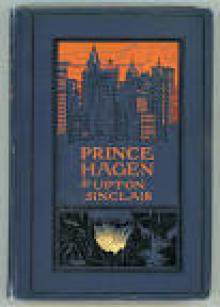 Prince Hagen
Prince Hagen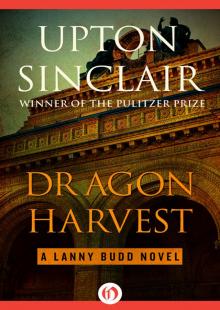 Dragon Harvest
Dragon Harvest The Jungle
The Jungle Sylvia's Marriage
Sylvia's Marriage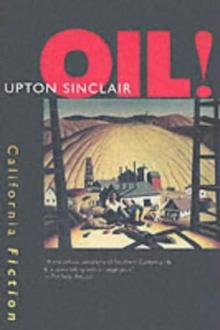 Oil! A Novel by Upton Sinclair
Oil! A Novel by Upton Sinclair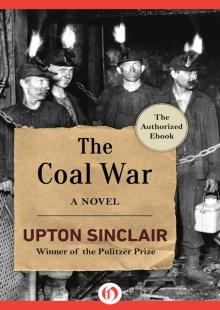 The Coal War: A Novel
The Coal War: A Novel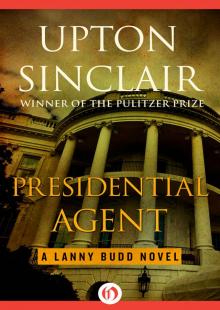 Presidential Agent
Presidential Agent World's End
World's End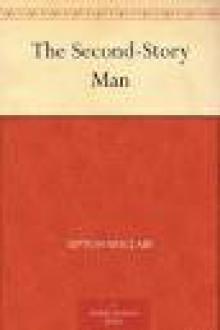 The Second-Story Man
The Second-Story Man O Shepherd, Speak!
O Shepherd, Speak!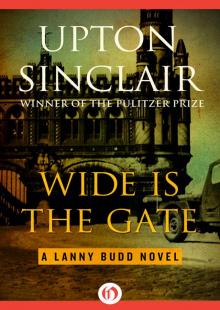 Wide Is the Gate
Wide Is the Gate The Return of Lanny Budd
The Return of Lanny Budd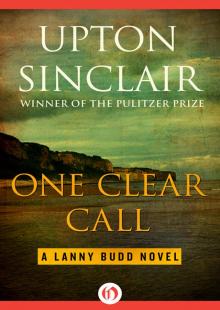 One Clear Call I
One Clear Call I 100%: the Story of a Patriot
100%: the Story of a Patriot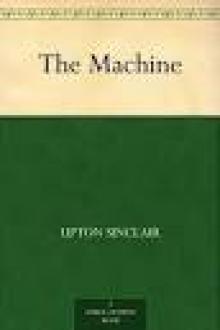 The Machine
The Machine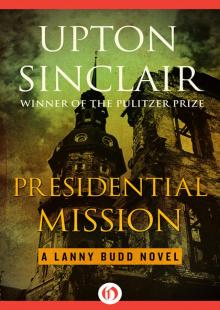 Presidential Mission
Presidential Mission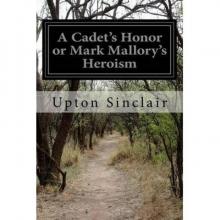 A Cadet's Honor: Mark Mallory's Heroism
A Cadet's Honor: Mark Mallory's Heroism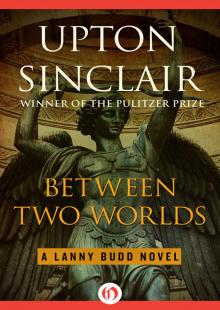 Between Two Worlds
Between Two Worlds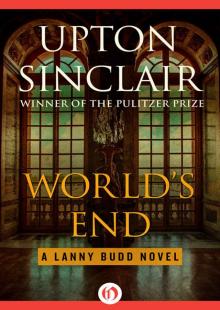 World's End (The Lanny Budd Novels)
World's End (The Lanny Budd Novels)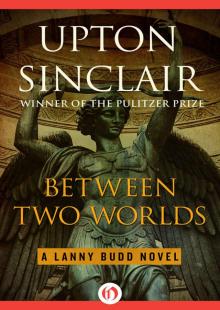 Between Two Worlds (The Lanny Budd Novels)
Between Two Worlds (The Lanny Budd Novels)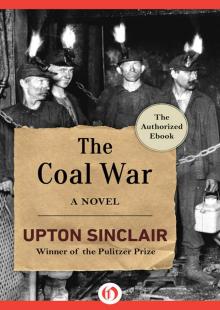 The Coal War
The Coal War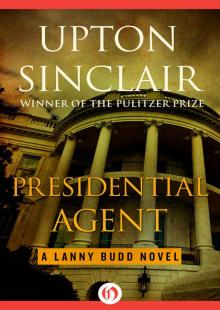 Presidential Agent (The Lanny Budd Novels)
Presidential Agent (The Lanny Budd Novels)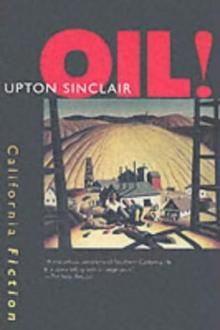 Oil (filmed as There Will Be Blood)
Oil (filmed as There Will Be Blood)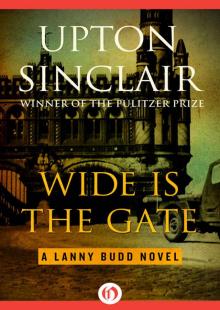 Wide Is the Gate (The Lanny Budd Novels)
Wide Is the Gate (The Lanny Budd Novels)